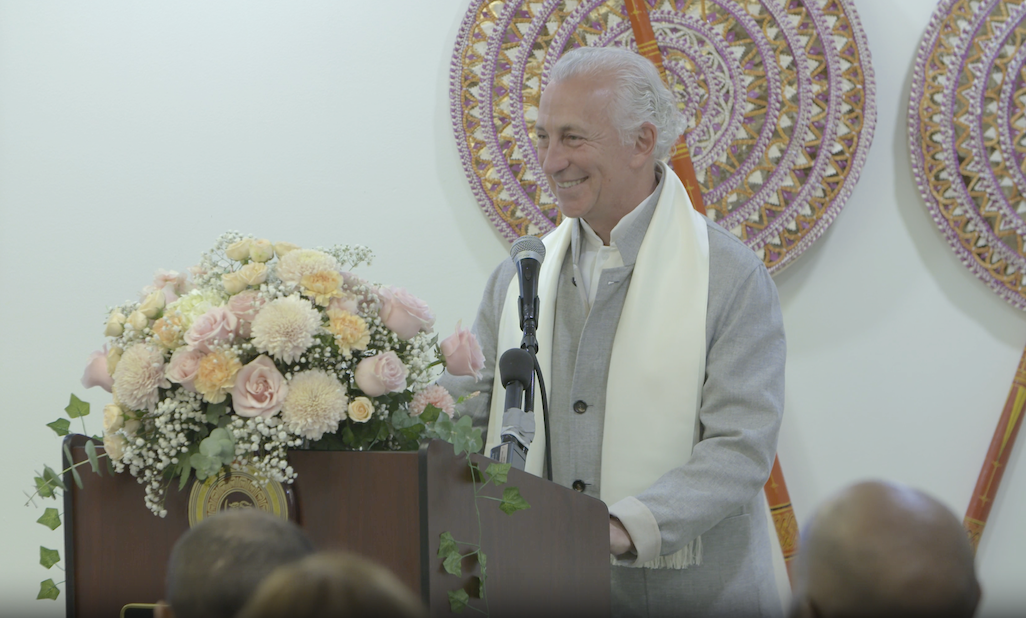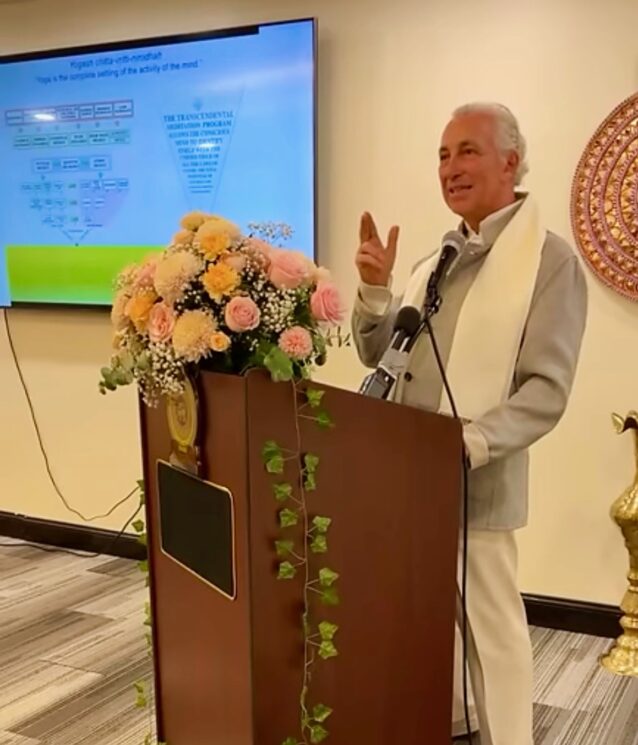
MIU President Dr. Tony Nader speaks at the first annual United Nations World Meditation Day, offers key to world peace
MIU President Tony Nader put forward a practical pathway to reduce global tensions and relieve the global mental health crisis as part of his keynote address during the UN’s first annual “World Meditation Day,” held on December 21.
“Meditation is not a luxury — it’s a necessity,” Dr. Nader said. He described it as a simple, mechanical, universal re-set system that promotes peace and health and doesn’t depend on any belief or way of life.
Dr. Nader cited the constitution of UNESCO (the United Nations Educational, Scientific, and Cultural Organization), which states, “Since wars begin in the minds of men, it is in the minds of men that the defenses of peace must be constructed.” The authors of the constitution recognized that world peace depends on inner personal transformation, Dr. Nader said. But no one has had a technique to accomplish this systematically and on a wide scale.

But this is exactly what the Transcendental Meditation technique accomplishes, he said. The practice enables us to “go back home” to “our true inner self,” to “enliven that on an individual level and enliven it in society. And then, naturally, spontaneously, the right decisions will be made and we can have a life of peace and harmony and well-being.”
Comparing the process to resetting a computer, Dr. Nader described meditation as a powerful prevention tool for protecting against mental and physical illness.
“It doesn’t depend on believing in it,” he said. “It doesn’t depend on a particular way of life, a particular religion, a particular belief in anything. It’s simple and mechanical.”

The ever-present stress, danger, and fear in the world activates the brain’s fight-flight-or-freeze response and shuts down the prefrontal cortex, the brain’s CEO, responsible for thinking and planning effectively, Dr. Nader said. Unless we give our brains a chance to re-set, we may develop physical and mental health challenges — a global issue today.
Fortunately, he said, the world’s great knowledge traditions developed procedures for calming the brain so we can think and plan clearly — and now we need those meditation techniques more than ever.

Evidence based
Dr. Nader reviewed research showing that Transcendental Meditation practice easily and effortlessly allows the mind to settle down into a state of inner peace and quiet. This experience dissolves stress and promotes integrated brain functioning, yielding extensive benefits for mental and physical health, including heart health.
He described further peer-reviewed research showing that this effect of inner peace radiates into the environment and can cause whole societies to become more peaceful — reflected in reduced rates of crime, infectious diseases, accidents, suicides, and even reduced war violence and war deaths. He described a dramatic 1993 study in Washington, DC, in which researchers predicted that violent crime in DC would drop 20% when a large group gathered to practice TM together — and it dropped more than 23% during the final weeks of the two-month study.
Explaining the underlying mechanism at work, Dr. Nader said that when one’s mind settles inward beyond thoughts and perceptions, one experiences and enlivens the field of pure consciousness, the unified field of natural law at the basis of everyone and everything, creating waves of harmony, coherence, and peace everywhere.
Other diplomats emphasize the value of meditation
More than 200 people gathered to hear Dr. Nader speak. These included diplomats from about 30 UN member states, including senior diplomats from the core group of countries that sponsored the proposal for World Meditation Day — India, Sri Lanka, Liechtenstein, Nepal, Mexico, and Andorra — and leaders of UN-affiliated non-governmental organizations.
The diplomats from the six core UN member states also spoke at the event, emphasizing that meditation is a vital component in all diplomatic efforts to achieve conflict resolution and peace.
Volker Türk, UN High Commissioner for Human Rights, speaking by live video conference from Zurich, underlined the universality of meditation, its contribution for effective diplomacy, and its benefits for individual and collective well-being.

The UN General Assembly — all 193 member nations — had unanimously passed a resolution on December 6 declaring December 21 to be World Meditation Day. The resolution was sponsored by Andorra, Bangladesh, Bulgaria, Burundi, Dominican Republic, Iceland, India, Liechtenstein, Luxembourg, Mauritius, Mexico, Monaco, Mongolia, Morocco, Nepal, Portugal, Slovenia, and Sri Lanka.
Additional reporting by Adrienne Schoenfeld
